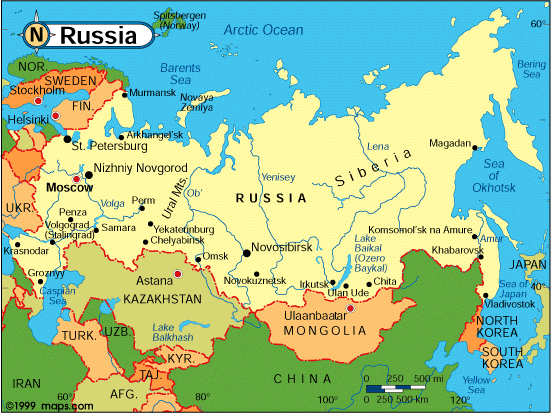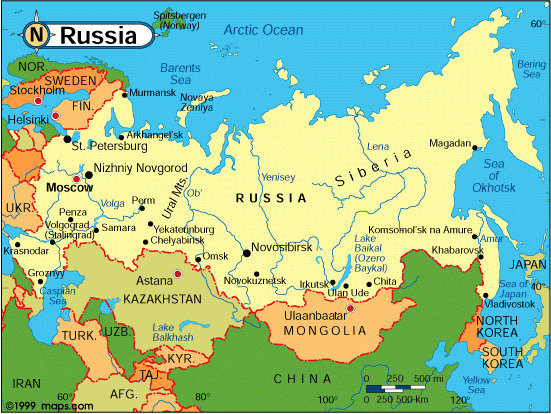The USG Open Source Center translates the statement at the website of the Russian Ministry of Foreign Affairs sharply condemning Israel:
Text of “Russian Foreign Ministry statement in connection to reports about air strikes by the Israeli Air Force on targets on Syrian territory” published on the Russian Ministry of Foreign Affairs website on 31 January
“Moscow is gravely concerned by reports about Israeli Air Force strikes on Syrian facilities close to Damascus. If this information is confirmed, then we are dealing with unprovoked strikes at targets on the territory of a sovereign state, which grossly violates the UN Charter and is unacceptable, whatever motives are used to justify it.
We are taking emergency measures to clarify all details of this situation.
We once again call for stopping all violence in Syria, not allowing any sort of foreign interference and starting an all-Syrian dialogue on the basis of the Geneva accords from 30 June 2012.
(Dated) 31 January 2013″
(Description of Source: Moscow Ministry of Foreign Affairs of the Russian Federation in Russian — Official website of the Russian Foreign Ministry; URL: http://www.mid.ru)”
There were conflicting reports of what exactly the Israeli Air Force bombed in Syria. The Baath government said it was. military research center, while the Beirut press insisted it was an arms convoy transferring SA 17 missile launchers for Syrian ally Hizbullah.
If it was the convoy with the SA 17s, the regime may have been transferring them to Hizbullah for fear they might fall into rebel hands. The rebels have been taking military bases and looting them for weaponry. The regime’s advantage has been its planes, helicopter gunships and tanks, and the SA 17s would be a powerful equalizer. So much better to put them in Tyre. Moreover, once there, Hizbullah could use them to protect Syria from Israeli aircraft flying in over Lebanese territory. In that case, their destruction by Israel was a risk worth taking. The regime did not lose that much by their destruction, and they are still denied to the rebels.
Russia’s angry reaction probably has less to do with Israel itself (with which the Putin government is friendly) than with a fear that Israel might set a precedent for military intervention in Syria. After all, Turkey has as much reason to bomb the place as Israel does, having taken lost a plane to a Syrian missile and having taken artillery fire from the Syrian side. And, France has been taking a harder stance in favor of some sort of intervention.
So the last thing the Putin government wants is for Israel to start a trend.
The brutally frank language toward Israel is also consistent with Putin’s recent instructions to the Foreign Ministry to toughen up its rhetoric and to emphasize hard power to repel threats from the “ring of enemies” around Russia. (“Putin Call for Tougher Foreign Policy Seen Aimed Primarily at Domestic Audience,” Gazeta.ru, Jan. 29, 2013, via USG Open Source Center). Russia feels that NATO has illegitimately made incursions into eastern Europe (and the US is putting missiles in the Czech Republic), and resents that Turkey is in NATO and Afghanistan is in the US sphere of influence. This fear of encirclement is part of the reason for Moscow’s support for the Baath in Syria.
Gen. Makhmout Garayev, president of the Academy of Military Sciences, likewise sees the world as hostile. In an article in Voyenno-Promyshlennyy Kuryer Online on Jan. 29, 2013, He wrote:
“The loss and infringement on national sovereignty will become a general tendency in the development of the majority of countries. The “democracy” which is being coercively sown throughout the world is taking on monstrous forms. The harsh violence with Qaddafi is explained not just by the shortcomings of democracies or the presence of cheap oil, but above all by his plans for the creation of a union of African states, the nationalization of natural resources, and the introduction of an African currency. Next in line are Syria and Iran.”
and:
“Political goals in the modern world are achieved in two ways. First, by disruptive actions, “the color revolutions” within opposing countries, and large-scale information actions. Second, by way of the unleashing of local wars and conflicts, as was done against Yugoslavia, Iraqi, South Ossetia and Afghanistan, and as is being attempted now in Syria and Iran. In order to secure itself from this, Russia must be powerful above all in the economic and technical senses.”
So to defend Russia from the ring of enemies, and to avoid its subjection to an alliance of the US and China, the general argues, Russia must be strong. Strength implies saving Syria from its color revolution, and hence protecting it from foreign attack or occupation.
In short, Russia sees an attack on Syria as an attack on itself.
The problem is that Russia isn’t ringed by enemies, Syria is not having a foreign-instigated revolution but an indigenous one, the Us does not covet Russia’s natural gas, and there is no Washington-Beijing axis against Moscow. Russia doesn’t need to make a stand in Syria to protect Russia.
(Since some people aren’t good at geography, I include a map showing that Russia is surrounded by China, Mongolia, Kazakhstan, the Ukraine (now rejected by NATO), Belarus and Finland– not exactly the most threatening configuration and it is certainly not ringed by enemies!)




 © 2025 All Rights Reserved
© 2025 All Rights Reserved